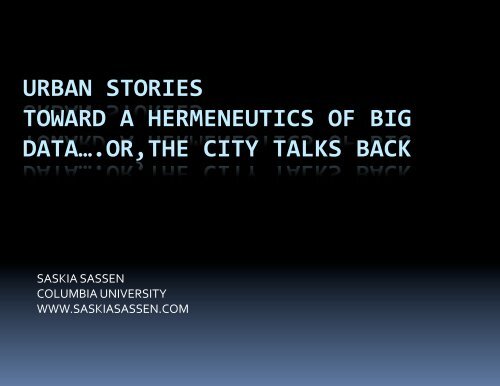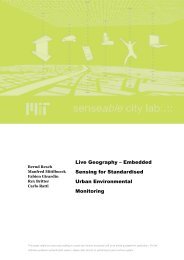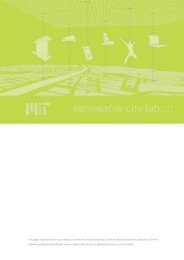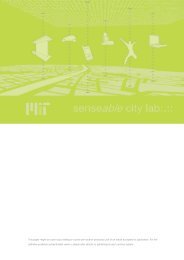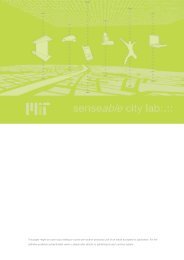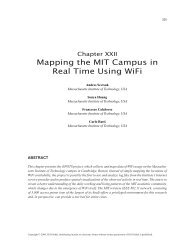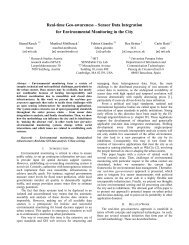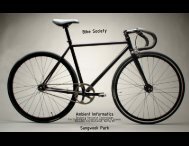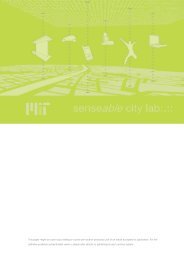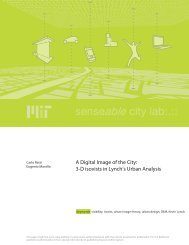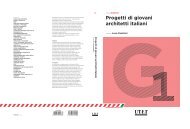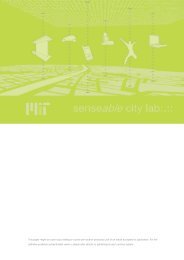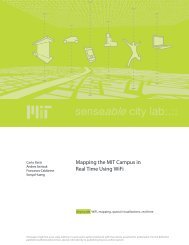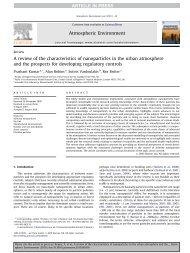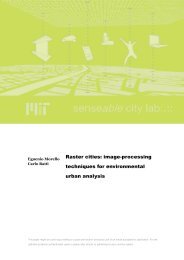Download (pdf) - MIT SENSEable City Lab
Download (pdf) - MIT SENSEable City Lab
Download (pdf) - MIT SENSEable City Lab
- No tags were found...
Create successful ePaper yourself
Turn your PDF publications into a flip-book with our unique Google optimized e-Paper software.
URBAN STORIES TOWARD A HERMENEUTICS OF BIG DATA….OR,THE CITY TALKS BACK SASKIA SASSEN COLUMBIA UNIVERSITY WWW.SASKIASASSEN.COM
URBANIZING BIG DATA § Sensors everywhere connected to computers give us big data sets. Today they are mostly about consumers and analyzed for businesses. § What would it mean to urbanize big data—not just to gather data about consumers and traffic in cities, or about the city, but to urbanize it.
To Extract Urban Stories from Big Data
DISTANCES § The distance between BIG DATA derived from all aspects of a city and URBAN CODE. § (Big data as a type of data is not enough. Urban Code gives us a link, an application to the city.)
And the distance between URBAN CODE and URBANIZED BIG DATA.
HERMENEUTICS OF BIG DATA § Seeking to detect the urban side.
THIS IS NOT IT
Security regimes § 1,271 government organizations and 1,931 private companies are gathering intelligence data in about 10,000 locations across the US § An estimated 854,000 people – nearly 1.5 times as many people as live in Washington, D.C. – hold top-secret security clearances
MAP OF GOVERNMENT AND PRIVATE Source: Washington Post. 2010. “Top Secret America,” Interactive Maps. SECURITY AGENCIES IN THE US
WHAT IS THE URBAN SPECIFICITY here? § what is the urban element or marker: many possible answers. § Let me emphasize one: the mix of multitude and space succeeds in re-‐coding these machines for destruction and death. § ADDING THIS SPECIFIC BIT OF KNOWLEDGE/INFORMATION helps urbanize this data set.
URBAN RESIDENTS TALK BACK § Connecting urbanized big data to the project of an open-‐source urbanism is one type of urban shaping. § Urban residents: not only a source of information bits for big data. § One effect , conceivably: it would raise the productivity of urban residents in driving open source urbanism
Intelligent Cities: Risk of technical obsolescence § Excessively ‘closed’ technical systems that involve people (example Intelligent Cities) are at high risk of becoming obsolete . They do not register the way users might keep diverging from what the engineer had in mind.
. § The more widespread the use of intelligent systems in a city, the more the city itself is at risk of becoming obsolete.
DEAD CITIES
DEAD Cities: Advanced stage
Urbanizing Technology § The specific technical capabilities of interactive technologies deliver their utilities through complex ecologies. § These ecologies include more than just the technical: § They also include the logics of users § And these can diverge significantly from the engineer’s logic.
THE CITY TALKS BACK § Not only city residents should be part of an open-‐source urbanism. § Also cities. § The city talks back…..it’s just that we don’t know that language anymore. § The city is a knowledge partner. § Example: a car made for speed, distance and difficult terrain, is reduced to something else in the traffic of a city center. § The city has spoken.
The <strong>City</strong> as Hacker § Of spaces § Of technologies § Of individual’s self-‐interest: the capacity of making a collective good even if the individuals involved are selfish and nasty. § Of excessively rigid technological systems
The city tells us what works § The city is one window into understanding successful technological innovations for urban systems and urban life § The city as a powerful “hacker” of technologies: it alters the original design, adjusts it to urban users.
URBANIZING BIG DATA § MIXING URBAN COMPLEXITY AND MUTANCY WITH THE DATA


